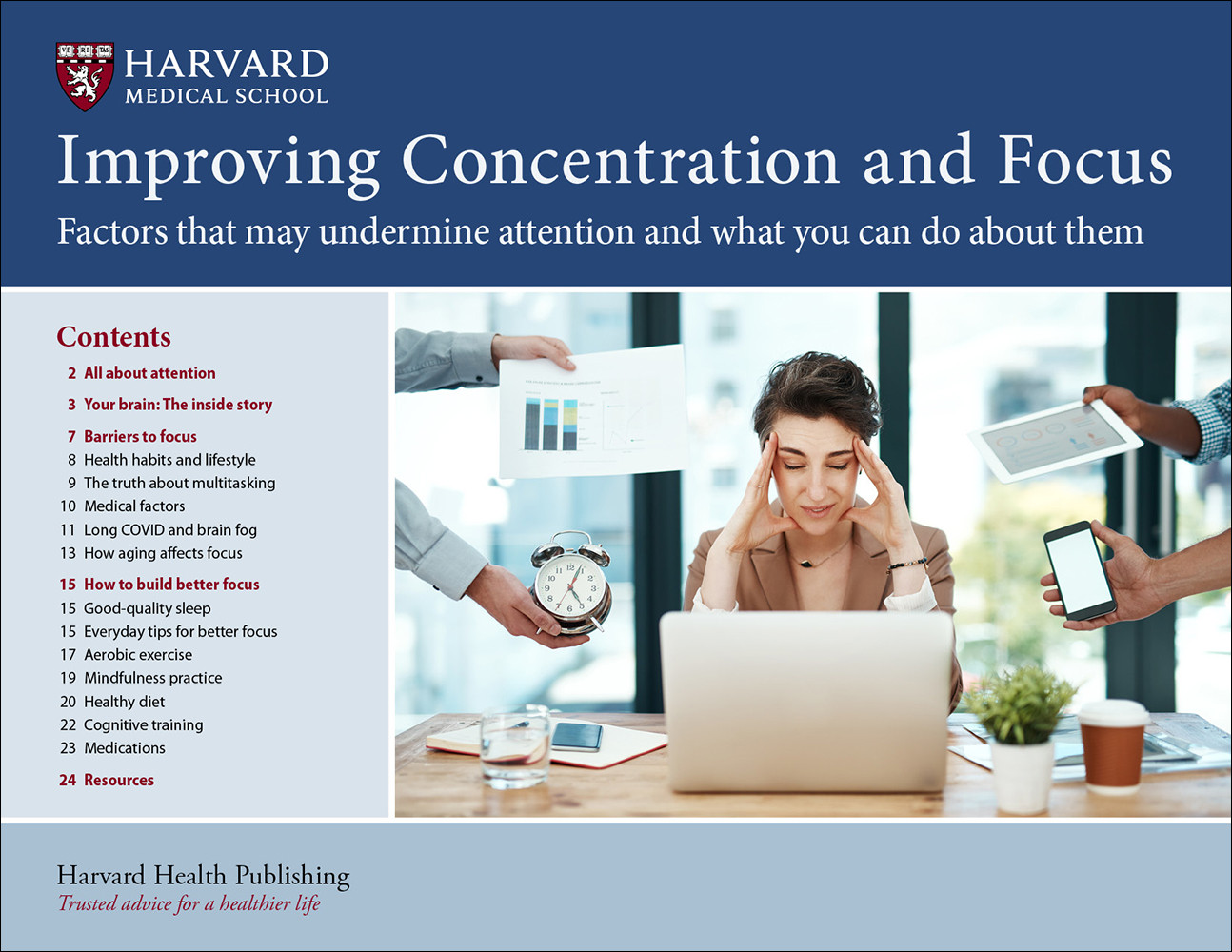Finding your focus
Trouble concentrating when doing even the simplest tasks? Here are eight tips to keep your attention front and center.

Your brain is a three-pound supercomputer capable of almost unlimited power to learn, remember, and solve problems. Yet, like any other body part, it gradually slows with age. Over time, people may find it harder to perform certain thinking skills, especially the ability to concentrate and focus.
"This can make it challenging to retain essential medical information, manage personal finances, and remember detailed directions," says Joan Gillis, senior clinical team manager of Geriatric Psychiatry Inpatient Services at Harvard-affiliated McLean Hospital.
Brains also can get "rusty" as people age, since they are less likely to regularly engage in mentally-stimulating activities like working and socializing.
Fortunately, there are ways to keep your attention at full attention. Here are some strategies.
In the moment
When you feel your attention waning or need to prepare your brain for situations that require a high level of focus, try the following:
Avoid multitasking. "Don't be a mental superhero," says Gillis. "Do one task at a time until it's completed, and then move on to the next one. That way, your mind doesn't have to compete with other stimuli."
Work in blocks of time. Find your ideal time frame for brain work. When you do routine mental activities, like reading a book passage, take note how much time has passed before your attention drifts. "You should be able to find a range where your attention is at its peak," says Gillis. Work within this time segment (set a reminder when time's up), take a break, and then return for another round.
Remove distractions. Turn off your TV and set up website blockers so the Internet won't tempt you. If your smartphone interferes with your ability to stay focused, place it in a drawer, another room, or anywhere that you can't see or hear it while you try to concentrate. You also can adjust your phone's settings to block calls during certain hours. (If you're worried about missing a critical call, you can create a list of contacts who will be allowed to reach you.)
If you find that some background noise actually helps with concentration, listen to soothing ambient sounds, like nature settings or white noise.
Take a quick run. A study published online Nov. 22, 2021, by Scientific Reports found that just 10 minutes of moderate-intensity running increases blood flow to the prefrontal cortex — the part of the brain responsible for executive function skills, like staying focused on a task until completion. Not a runner? Try a brisk walk — or anything else that gets your body moving and heart pumping.
Build a better brain
These lifestyle habits help maintain a healthy brain and keep thinking skills sharp.
Stay mentally engaged. Like your muscles, your brain needs frequent "exercise" to achieve and maintain peak performance. There are many ways to work out your mind and your thinking skills. For example, do crosswords and jigsaw puzzles, join a book club, take a class, volunteer, or work part-time.
Get enough rest. Aim for seven to nine hours of sleep nightly. Stick to a strict sleep schedule, and get to bed around the same time each night. Speak with your doctor about any medical issues that can cause sleep problems, such as obstructive sleep apnea, restless legs syndrome, frequent nighttime bathroom trips (often caused by an enlarged prostate), or joint pain.
Check your medication. Many prescription drugs and even some over-the-counter medical products can make you drowsy and less focused. Your pharmacist can review your medications for these side effects; then you can talk with your doctor about switching drugs or lowering doses if needed.
Watch the caffeine. Studies have shown caffeine can temporarily increase attention, but too much can make you jittery and anxious and distract your thinking. The FDA considers 400 milligrams per day — the amount found in about four or five cups of coffee — a safe level for healthy adults, but experiment to find out how much gives you a mental jolt without the jitter.
Be open to mindfulnessPracticing mindfulness is another way to improve focus. One exercise to try is open awareness. The goal is to keep your mind from wandering while doing routine and mundane tasks like eating, showering, cooking a meal, or household cleaning. Here's how to do it:
|
Image: © SDI Productions/Getty Images
About the Author

Matthew Solan, Former Executive Editor, Harvard Men's Health Watch
Disclaimer:
As a service to our readers, Harvard Health Publishing provides access to our library of archived content. Please note the date of last review or update on all articles.
No content on this site, regardless of date, should ever be used as a substitute for direct medical advice from your doctor or other qualified clinician.
















